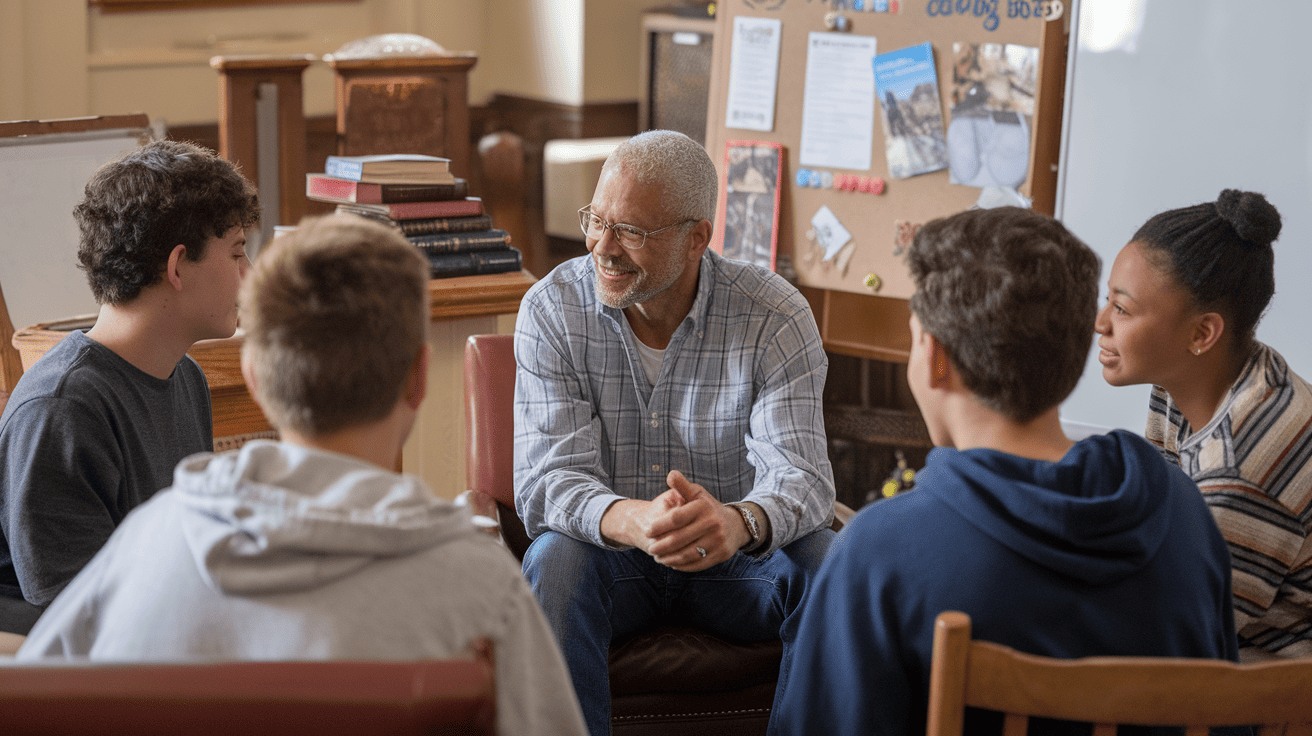Youth Group Leader Guide: Roles & Qualities

Every great youth group has one thing in common: a leader who cares, guides, and inspires.
A youth group leader isn’t just someone who plans events or organizes activities; they’re a mentor, friend, and role model.
Their role goes beyond running weekly meetings. They help young people grow in confidence, build stronger relationships, and learn important life lessons.
Youth leaders create safe and positive spaces where teens feel valued and inspired.
Even in schools, churches, or community centers, these leaders play a huge role in shaping future generations.
If you’ve ever wondered what makes a youth group leader effective, their main responsibilities, and the qualities they need, this guide will give you everything you need to know.
What Is a Youth Group Leader?
A youth group leader is a mentor, guide, and role model who works with young people in schools, churches, or community programs.
Their role goes far beyond simply running events; they build meaningful relationships and provide encouragement during important years of growth.
Youth leaders create safe, welcoming spaces where teens can connect, learn, and feel valued. They organize activities that balance fun with purpose, promote teamwork, and inspire confidence.
At the heart of their work is a deep commitment to helping young people discover their strengths, develop character, and grow into responsible, caring members of their community.
Key Responsibilities of a Youth Group Leader

A youth group leader wears many hats. From planning activities to mentoring teens, their responsibilities shape the group’s success and growth.
1. Planning And Leading Activities
Youth leaders design fun, purposeful activities like games, workshops, or service projects.
These activities bring energy, build friendships, foster personal growth, and create memorable experiences that teens will value for years.
2. Mentoring And Guiding
They listen actively, offer consistent support, and help teens navigate life’s challenges.
A leader provides stability, trusted advice, and guidance while helping youth make wise decisions and develop strong character.
3. Building Relationships
Strong connections matter deeply. Leaders invest time to know each youth personally, celebrating successes and offering support during tough seasons.
They create bonds built on trust, respect, and genuine care.
4. Teaching And Inspiring
Youth leaders share meaningful lessons, engaging stories, and thought-provoking discussions that inspire growth.
They guide youth toward critical thinking, questioning assumptions, and applying positive values in their daily lives.
5. Creating A Safe Environment
A leader confirms that the group feels welcoming and inclusive for everyone.
They prevent bullying, encourage kindness, promote acceptance, and make sure every teen feels valued, heard, and respected within the community.
6. Coordinating Parents And Volunteers
Behind the scenes, leaders organize volunteers effectively and keep parents actively involved.
This critical teamwork keeps events running smoothly, builds community support, and strengthens the overall group dynamics and success.
7. Handling Challenges
Unexpected problems arise, conflicts between teens, schedule changes, or discipline issues.
Leaders stay calm under pressure, adapt quickly to new situations, and guide youth through difficulties with wisdom and patience.
Tips for Becoming a Great Youth Group Leader
Leading youth requires patience, care, and creativity. These practical tips will help you guide teens with confidence and purpose.
- Build Trust With Youth: Show consistent care by knowing teens personally
- Keep Activities Fun and Purposeful: Balance exciting games with meaningful lessons always
- Stay Organized And Prepared: Plan ahead clearly and manage time wisely
- Be Authentic And Honest: Be genuine always; teens respect true honesty
- Encourage Youth To Participate: Let teens share ideas, lead, and engage
- Keep Growing As A Leader: Keep learning continuously and bring fresh ideas
Strong leadership grows from small, consistent actions. These habits inspire trust, build confidence, and create lasting positive change in youth.
Qualities of an Effective Youth Group Leader

An effective youth group leader balances genuine care with strong leadership skills.
These essential qualities create trusted relationships and positive environments where young people thrive, feel safe, and develop crucial life skills.
1. Patience And Encouragement
They demonstrate unwavering patience when youth struggle with challenges, consistently offering supportive encouragement instead of harsh judgment.
Creating safe spaces where teens feel comfortable making mistakes and learning.
2. Strong Communication Skills
Exceptional communication abilities include active listening and speaking with remarkable clarity.
They hear what teens really mean, respond thoughtfully, and express ideas in ways young people easily understand and connect with.
3. Dependability And Trustworthiness
Their consistent reliability makes them completely trustworthy.
Youth know they can count on their leader to show up, keep promises, follow through on commitments, and provide stable support during difficult times.
4. Positive Attitude And Motivation
A consistently positive attitude keeps the entire group motivated and energized.
They maintain optimism during challenges, celebrate successes enthusiastically, and create an uplifting atmosphere that inspires continued participation and growth.
5. Deep Empathy And Understanding
Genuine empathy allows them to connect authentically with teens, truly understanding what young people feel and desperately need.
They recognize individual struggles, celebrate unique strengths, and respond with appropriate compassion.
6. Leading By Example
They consistently lead through powerful example, living out honesty, respect, and genuine kindness in every interaction.
Their authentic behavior demonstrates the values they teach, making lessons more impactful and meaningful.
7. Creativity And Flexibility
Natural creativity ensures activities remain fresh and engaging, while remarkable flexibility helps them adapt gracefully when plans change.
They innovate solutions, embrace new ideas, and adjust approaches based on group needs.
Reframing the Role of a Youth Group Leader
Many youth leaders feel pressure to be the “superstar” who runs everything perfectly, games, lessons, events, and more.
But this can lead to stress and burnout. The truth is, you don’t need to do it all. A youth group leader’s role is not about being the center of attention but about connecting, guiding, and empowering others.
Great leaders bring youth, parents, and the wider community together to share in the work of helping young people grow.
By shifting from performer to connector, you create a healthier group and a stronger, more supportive environment.
Final Thoughts
Being a youth group leader is more than just planning activities; it’s about guiding, inspiring, and supporting young people as they grow in faith, confidence, and community.
The role requires patience, creativity, and a heart for mentorship. Even if you’re organizing events, leading discussions, or simply listening, your impact helps shape the next generation in powerful ways.
While the responsibility can feel big, the rewards of seeing youth flourish are even greater.
If you’re ready to take the next step, start building your skills and confidence today.
Research resources, connect with other leaders, and embark on the journey of becoming the youth group leader your community needs.
Ready to lead? Begin your path today!
Frequently Asked Questions
What Does A Youth Group Leader Do?
They organize activities, guide teens, mentor youth, and create safe, fun spaces where growth and relationships naturally happen.
How Do I Become A Youth Group Leader?
Start by volunteering in youth programs, gaining experience, and showing reliability. Training or mentorship strengthens your ability to lead.
What Skills Make A Great Youth Group Leader?
Patience, empathy, creativity, dependability, and communication are essential. These skills create trust and make leadership strong and effective.
Can Youth Group Leaders Work Outside Of Churches?
Yes, leaders can guide youth in schools, clubs, and community groups, creating safe and positive environments for growth and belonging.






